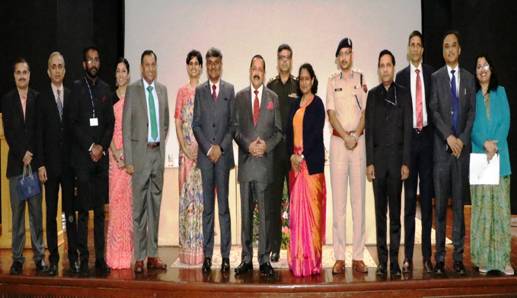Union Minister Dr Jitendra Singh says, the curriculum for IAS/Civil Services must suit India’s changing scenario and therefore, needs constant modification from time to time
Union Minister Dr Jitendra Singh says, the curriculum for IAS/Civil Services must suit India’s changing scenario and therefore, needs constant modification from time to time
Addresses the valedictory session of Joint Civil-Military Program (JCM) at the Lal Bahadur Shastri National Academy of Administration (LBSNAA), Mussoorie
Posted On: 11 SEP 2021, Delhi
Union Minister of State (Independent Charge) Science & Technology; Minister of State (Independent Charge) Earth Sciences; MoS PMO, Personnel, Public Grievances, Pensions, Atomic Energy and Space, Dr Jitendra Singh said here today that the curriculum for IAS/Civil Services at Lal Bahadur Shastri National Academy of Administration (LBSNAA) must suit India’s changing scenario and therefore, needs to be accordingly modified constantly and from time to time. This is also important to re-orient present and future administrators for the visionary roadmap that Prime Minister Narendra Modi has laid down before us for the next 25 years till independent India turns 100.
Addressing the valedictory session of Joint Civil-Military Program (JCM) at the Academy today, Dr Jitendra Singh called for joint programmes by institutes which are devoted to capacity building for good governance like, for example, LBSNAA, National Centre for Good Governance (NCGG), Indian Institute of Public Administration (IIPA), Institute of Secretarial Training and Management (ISTM) etc., so that instead of working in silos, there could be synergistic programmes which would supplement the individual efforts made by these institutes. He also suggested widening the range of the visiting faculty at the Mussoorie Academy and making Guest faculty more inclusive of scientific experts, industrial entrepreneurs, successful Start-ups and women achievers.

One major step taken by the Department of Personnel & Training (DoPT) in the direction of major reforms, the Minister said, was instituting “Mission Karmayogi”, which when defined would be the emphasis on shift of functioning from ‘Rule to Role’.
Congratulating the Course Coordinator and the staff of the Academy for successfully conducting the one-week Joint Civil-Military Programme, Dr Jitendra Singh also complemented the officers who attended the programme, which is intended to provide structural interface between Civil Service officers and Armed Forces officers for a better and shared understanding, coordination and collaboration during joint duties and for the purpose of serving the national security of the country.
The Minister said, this programme was initiated in 2001 in the aftermath of Kargil War and has gone a long way in familiarizing the participants with the challenges of external and internal security and plays a wider role in exposing the participating officers to the imperative Civil-Military synergy.
As India enters 75 years of its independence, said Dr Jitendra Singh, and plans for the next 25 years, such programmes enable us to prepare the Civil and the Military authorities to jointly work in different conflict situations internally as well externally.
Earlier Director, LBSNAA, K Srinivas gave an outline about the Civil-Military programme and its objectives.





